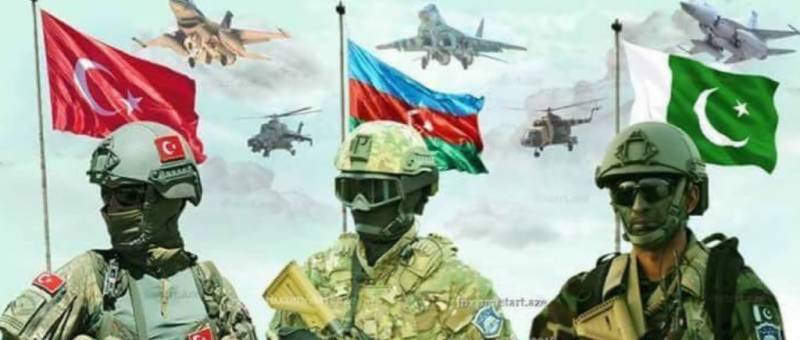Why is Iran angry with the trilateral alliance of Pakistan, Turkey and Azerbaijan?
By Aditi Bhaduri
The Azerbaijan-Pakistan-Turkey axis, it seems, has not roiled India alone. Iran too seems to be infuriated by the trilateral alliance. Recent tensions between Iran and Azerbaijan point to Tehran’s disquiet about the alliance, especially its military angle.
A war of words has erupted between Iran and Azerbaijan over the past week. The apparent raison d’etre was the military drills that Iran had begun along its Azeri borders.
Iran’s influential Islamic Revolutionary Guard Corps (IRGC) in a statement said that the Islamic Republic would not tolerate any changes in the geopolitics of borders and would confront with all its might the inimical actions of its enemies. “We warn all those who are trying to destabilize the northern borders of Iran, and assert our preparedness to impede the evil designs of our enemies.”
The Iranian state media reported that the drills involved armoured and artillery units as well as drones and helicopters.
****
[Azerbaijan] had earlier in September held the first ever trilateral military exercises with Turkey and Pakistan in Baku. Azeri Defence Minister Hikmat Mirzayev was quoted as saying, “Azerbaijan, Turkey and Pakistan have entered the history of humanity as close friends and brothers. At the heart of these relations are the close ties between our peoples. Evidence of this can be seen in the solidarity and support of Turkey and Pakistan to Azerbaijan from the first day of the 44-day counteroffensive operations launched by Azerbaijan against the Armenian armed forces on September 27, 2020.”
No doubt, the Iranian military exercises were a response to it….Last year a similar spat had broken out between Iran and Turkey after Turkish President Recep Tayyip Erdogan had recited a poem on his trip to Baku to commemorate Azerbaijan’s victory in the Nagorno-Karabakh conflict. The poem alluded to a vision of “Greater Azerbaijan” which includes Iran’s northern districts populated by Iranian ethnic Azeris, the largest non-Persian ethnic minority in the country.
The recent rise in “Turkic nationalism” and close cooperation between Ankara and Baku, which helped cement Azerbaijan’s victory in its war with Armenia last year, as well as give NATO member Turkey a strategic foothold in the South Caucasus, has not gone down well in Iran.
…Tehran is worried that the newly stirred up nationalism witnessed in Azerbaijan during the war and especially following its victory may stir up similar sentiments and provoke secessionist tendencies among its Azeri population. The war victory has also meant that some bordering regions with friendly Armenia have now become part of its border with Azerbaijan.
But yet another angle in bilateral tensions is Azerbaijan’s close relations with Iran’s arch-enemy Israel. At least since 2012 Azerbaijan is widely believed to be hosting an Israeli military base on its territory. It also has a $1.6 billion arms deal with Azerbaijan, committing to sell drones and anti-aircraft missile defence systems to Baku. Along with Turkey’s unpiloted aerial vehicles it was drones purchased from Israel that helped Azerbaijan suppress Armenian air defences.
****
Tehran fears that Azerbaijan’s territory could be used as a launchpad against it.
Finally, Iran’s strained relations with Pakistan are poised to get worse because of the Afghan crisis. Iran has slammed Pakistan for its role in the fall of Panjshir valley to the Taliban and demanded a probe. Alongside this, Pakistan’s protege – the Taliban are continuing with their persecution of Shiite Hazaras inside Afghanistan.
Therefore, the trilateral military show of strength and camaraderie between Azerbaijan, Turkey, and Pakistan may have just triggered yet another regional flashpoint – this time in the South Caucasus.


Reblogged this on Piazza della Carina.
LikeLiked by 1 person